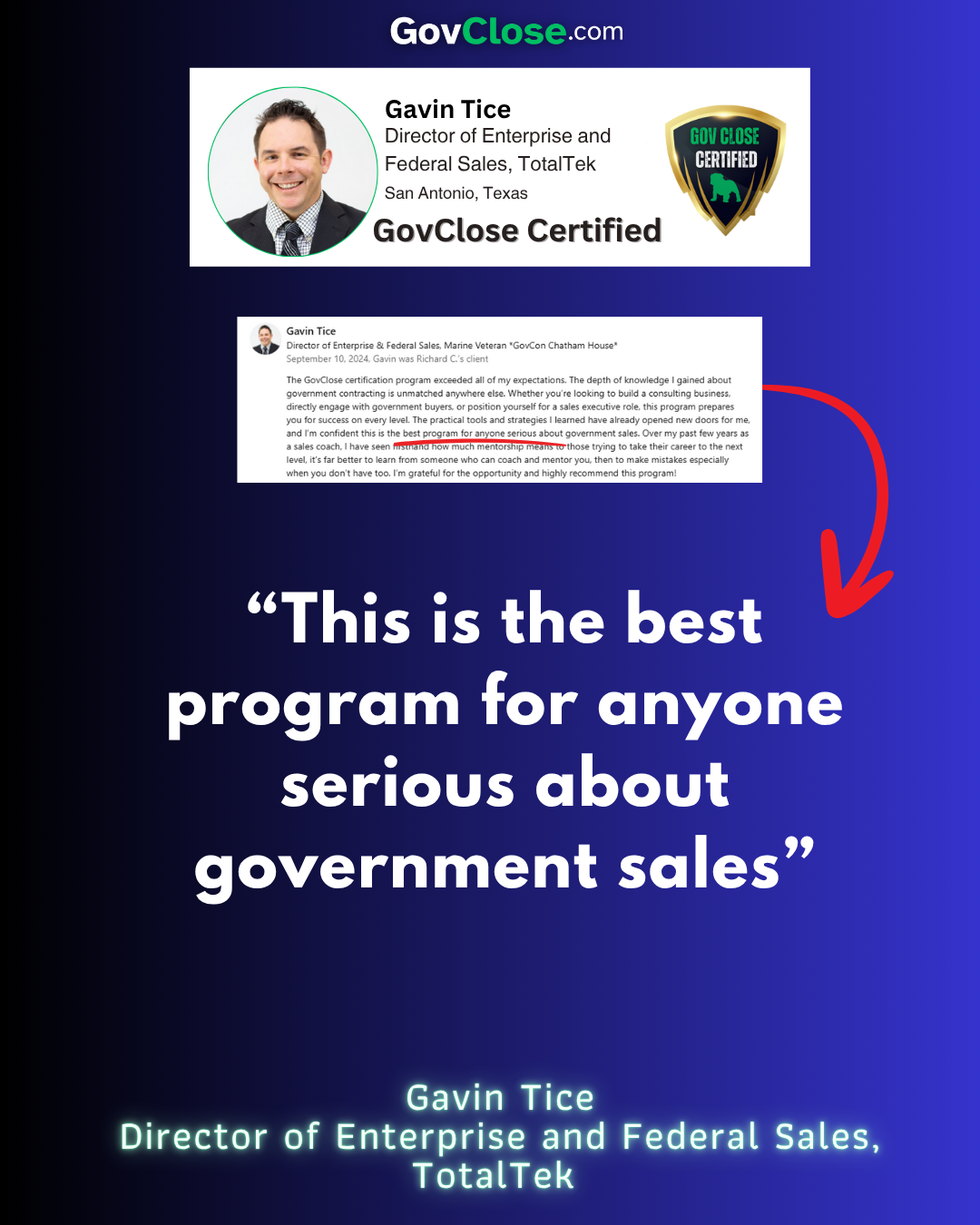This Email Campaign Generates Sales [Step by Step]
Oct 13, 2025If you’re in government contracting, consulting, or even just selling to the federal market as an account executive — chances are, you’re focused on proposals, meetings, and compliance.
But let me tell you something that surprises a lot of people in this space:
Email marketing can make or break your business.
I know — “email marketing” probably isn’t the first thing you think about when it comes to government contracts. You might think it’s only for eCommerce or social media marketers. But after years of helping companies and consultants win federal business, I can tell you that mastering email communication — and doing it the right way — is one of the most overlooked success factors in this field.
Whether you’re trying to book meetings with contracting officers, follow up with potential teaming partners, or reach private-sector clients who sell to the government, your email strategy directly impacts your results.
In this post, I’ll break down exactly what makes effective email communication work, why deliverability and subject lines matter more than you think, and how you can structure your emails to get real responses that lead to contracts, clients, and revenue.
Why Email Matters More Than Ever
Government contracting is built on communication.
From RFIs and proposals to teaming agreements and award notices — everything happens through email.
It doesn’t matter if you’re a small consulting firm, a subcontractor, or an independent consultant — if your emails aren’t being delivered, opened, and acted upon, your business is losing opportunities every single day.
Think about it:
-
How many times have you sent an important message and never heard back?
-
How many proposals or introductions have disappeared into the void?
Sometimes it’s not because your message was ignored — it’s because it never even reached their inbox.
That’s why I often say:
“In government contracting, your ability to communicate effectively is just as valuable as your ability to deliver results.”
Email marketing, when done right, helps you control that communication. It ensures your message lands where it’s supposed to — and drives the actions that grow your business.
The Four Core Goals of Every Email
Whenever I teach this topic inside my GovClose program, I tell students there are four things every email must accomplish:
-
Get delivered.
If your email never reaches the inbox, nothing else matters. -
Get opened.
A strong subject line makes all the difference — it’s the gatekeeper to your message. -
Get read (and acted on).
Keep it concise and focused on one clear next step. -
Stay compliant.
Follow the laws and best practices that protect your reputation and your business.
Let’s unpack each of these, because understanding them is the difference between being ignored — and closing real deals.
Step 1: Deliverability — The Hidden Foundation of Success
Most business owners focus on writing better emails — but before you even write a word, you need to make sure your emails are actually reaching people.
Deliverability comes down to a few key technical factors:
-
Authentication: Make sure your domain is properly set up with SPF, DKIM, and DMARC. These are like digital signatures that prove you’re a legitimate sender. Without them, your messages often get flagged as spam.
-
Warm-up process: If you’re using a new domain or email address, don’t start blasting 1,000 emails a day. Gradually increase your sending volume to build a positive sender reputation.
-
Avoid spam triggers: Keep links and attachments to a minimum, especially when emailing government addresses. Stick with plain text and always personalize your messages.
-
Test before sending: Tools like Mail Tester or MXToolbox can help you see if your emails are likely to land in inboxes or junk folders.
I’ve seen businesses lose thousands of dollars simply because their emails were being filtered out. Getting this right is the foundation of everything that follows.
Step 2: Subject Lines — Small Words, Big Impact
Here’s a little secret: your subject line is the single most important part of your email.
If your subject line doesn’t grab attention, the rest of your message will never be read — no matter how good it is.
Through years of testing, I’ve learned that shorter is almost always better.
Examples of effective subject lines might include:
-
“Quick question about your proposal strategy”
-
“Follow-up: contract opportunities”
-
“Tuesday 2PM?”
Sometimes, I’ve even seen single-word subjects like “Update” or “Intro” outperform long, detailed ones.
The key is to test and measure. Look at which subject lines get opened, and which don’t. The data will tell you what works for your audience.
Remember — your goal isn’t to impress. It’s to spark curiosity and get that open.
Step 3: Keep the Email Simple and Actionable
Once your email is opened, you have a few seconds to hold attention.
That’s not the time to paste your entire résumé or explain your life story.
Instead, focus on one clear objective — one thing you want the recipient to do.
That might be:
-
Scheduling a call
-
Replying with a quick answer
-
Confirming interest in a contract opportunity
Keep your message short. Three to five sentences are often enough. For example:
“Hi [Name],
I wanted to introduce myself — I help companies like yours improve their federal sales process and win more contracts. Would you be open to a quick 15-minute call next week to discuss how you’re approaching current government opportunities?”
That’s it. Clear, professional, and actionable.
Your goal isn’t to sell everything in one email — it’s to start a conversation.
Step 4: Follow the Rules and Stay Ethical
If you’re sending cold emails, you need to know the law. The CAN-SPAM Act sets clear requirements:
-
Always identify who you are and include your business address.
-
Provide a way for people to opt out of future emails.
-
Never use deceptive subject lines.
Beyond compliance, ethical email marketing builds trust — and in government contracting, trust is everything.
Cutting corners might get you short-term results, but it will destroy your reputation over time. And once your domain is blacklisted, it’s extremely difficult to recover.
The ROI of Email Done Right
Let me give you a quick real-world example.
One of my clients sent a campaign to around 7,000 people. Out of those, only 80 clicked the link — about a 1% click-through rate.
Sounds low, right?
But here’s the thing: that small group of engaged leads generated tens of thousands of dollars in new business.
That’s the power of email. Even modest engagement, when targeted correctly, can produce massive returns.
So don’t obsess over vanity metrics. Focus on quality, consistency, and clear calls to action.
Common Pitfalls (and How to Avoid Them)
If you’re just getting started, here are some mistakes I see all the time:
❌ Writing long, formal emails that overwhelm the reader.
✅ Instead: keep it conversational and focused on one outcome.
❌ Sending attachments to government emails.
✅ Instead: use a simple message and offer to share more if they’re interested.
❌ Not measuring results.
✅ Instead: track open rates, responses, and conversions so you can improve over time.
❌ Treating email as a one-time activity.
✅ Instead: think long-term — nurture relationships, follow up consistently, and add value.
How Email Fits into the Bigger GovClose Strategy
Inside GovClose, I teach email marketing as part of a complete government contracting strategy.
It’s not just about sending cold emails — it’s about building relationships, following up on proposals, and managing communication with contracting officers, teammates, and clients.
Our training program combines government sales fundamentals with business development and communication tactics like email outreach.
Why? Because the most successful consultants and contractors I know are also excellent communicators.
When you master the art of email, you don’t just improve your outreach — you accelerate your entire business.
Final Thoughts
You can have the best proposal strategy, the most innovative solution, or years of federal experience — but if your emails aren’t being read, you’ll struggle to grow.
Email marketing isn’t just for tech startups or influencers. It’s a critical business skill for anyone selling to the government or consulting in this space.
So start by fixing your deliverability. Simplify your subject lines. Focus on one call to action. Measure your results and refine as you go.
Over time, you’ll notice something powerful — more replies, more meetings, and more opportunities.
Because in the world of government contracting, your ability to communicate clearly and consistently is what separates the average from the exceptional.
If you want to learn exactly how to integrate this strategy into your consulting or contracting business, check out the GovClose Certification Program — where we walk you step-by-step through everything from federal sales and proposal strategy to communication systems like this one.
Email is just one piece of the puzzle — but it’s one that can transform your entire business when you master it.
👉 Learn more about starting your consulting business at GovClose.com
👉Get Weekly Government Contracting Business Tips: https://federalytics.substack.com
👉 Explore the GovClose Certification Program for step-by-step training
👉 Follow me on LinkedIn for free live training and Q&A
Turn Government Contracting Knowledge Into Income
This isn’t a course. It’s a certification and implementation system to help you build a consulting business, land a high-paying sales role, or scale your own company in federal contracting.
We hate SPAM. We will never sell your information, for any reason.


